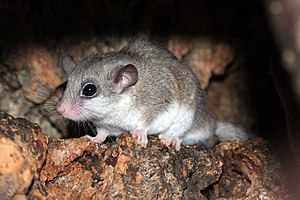dormouse
Wikipedia EN
A dormouse is a rodent of the family Gliridae (this family is also variously called Myoxidae or Muscardinidae by different taxonomists). Dormice are nocturnal animals found in Africa, Asia, and Europe. They are named for their long, dormant hibernation period of six months or longer.
Translations
Albanian: gjer; Armenian: քնամուկ; Asturian: llirón, llira; Basque: muxar; Belarusian: соня-палчок; Breton: lir, hunegan; Bulgarian: сънливец; Catalan: liró, rata dormidora; Chinese Mandarin: 睡鼠; Czech: plch; Danish: syvsover, hasselmus; Dutch: relmuis, hazelmuis; Esperanto: gliro; Estonian: kunel; Faroese: heslimús; Finnish: unikeko; French: loir; Friulian: glîr; Galician: leirón, lirio, liranco; German: Bilch, Bilchmaus, Schläfer, Schlafmaus, Siebenschläfer, Gartenschläfer, Haselmaus; Alemannic German: Haselmuus; Greek: δασομυωξός, μυωξός, ποντικοσκίουρος, μπλούχος, σπλήχος, πελέχι; Ancient Greek: ἑλειός, ἐλειός, μυωξός; Hungarian: pele; Icelandic: heslimús; Irish: luch chodlamáin, dallóg fhéir; Italian: ghiro, moscardino, muscardinide; Japanese: ヤマネ; Korean: 겨울잠쥐; Ladin: ghiro; Latin: glis, nitedula; Latvian: susuris; Lithuanian: miegapelė; Macedonian: полв; Maltese: ġurdien ta' denbu pjuma; Mongolian: унтаахай; Norwegian: syvsover, sovemus; Occitan: missara, greule; Polish: popielica, pilch; Portuguese: arganaz; Romani: xurtso, xurtsaika; Romanian: pârș; Romansch: durmigliet, glirida; Russian: соня; Sardinian: topi de venadroxu, medrona de tzirva; Scottish Gaelic: dallag; Serbo-Croatian Cyrillic: пух; Roman: puh; Slovak: plch; Slovene: polh; Sorbian Lower Sorbian: pjelch; Upper Sorbian: lěsna myška, połch, połšk; Spanish: lirón; Swedish: sjusovare, sovmöss, hasselmus; Turkish: kakırca; Ukrainian: соня; Vietnamese: chuột sóc; Welsh: pathew; West Frisian: sânslieper

